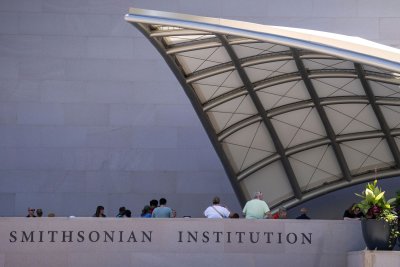Trump criticizes Smithsonian portrayal of slavery amid call for review

Aug. 19 (UPI) — President Donald Trump stepped up his criticisms of the Smithsonian on Tuesday, deriding the museums for its negative portrayal of slavery in American history.
Trump wrote in a post on his Truth Social platform that he would direct his attorneys to “review” the Smithsonian in the same way his administration has sought to reshape colleges and universities. The post comes a week after the White House announced it was subjecting the influential museum consortium to an unprecedented examination of its materials, signaling it had become a focal point in Trump’s efforts to transform cultural institutions.
In his post, Trump wrote that museums all over the country are the “last remaining segment of ‘woke.'”
“The Smithsonian is OUT OF CONTROL, where everything discussed is how horrible our Country is, how bad Slavery was and how unaccomplished the downtrodden have been — Nothing about Success, nothing about Brightness, nothing about the Future,” Trump wrote.
Rep. Jim McGovern, D-Mass., reacted with a post on X, writing that if “Trump thinks slavery wasn’t bad, he clearly needs to spend more time in a museum.”
Roughly 17 million people visited one of the Smithsonian’s 21 museums and galleries last year.
Smithsonian Institution Secretary Lonnie Bunch III, who is the first African American to lead the institution and has held the position since 2019, has previously commented on the importance of acknowledging slavery’s impact on American history.
“I believe strongly that you cannot understand America without understanding slavery, that our notions of freedom, our notions of liberty are juxtaposed with our notions of enslavement,” he said in an interview on Face the Nation in 2021. “And so I think that it’s not about pointing blame, it’s not about remembering difficult moments just to hurt.”
Last week, three White House aides wrote to Bunch in a letter notifying him the museum would be subject to a review to “ensure alignment with the President’s directive to celebrate American exceptionalism, remove divisive or partisan narratives, and restore confidence in our shared cultural institutions.”
The reshaping of the Smithsonian and its galleries and museums has been part the Trump administration’s goal to remove left-leaning ideology from the federal government and cultural institutions.
In March, Trump signed an executive order directing the Smithsonian to eliminate “divisive” and “anti-American ideology” from its museums, pointing to exhibits that “promoted narratives that portray American and Western values as inherently harmful and oppressive.”
He also named himself chairman of the Kennedy Center for the Performing Arts, seemingly in opposition to its having hosted performances he disagreed with for promoting so-called woke ideology. The move prompted many performances and performers to cancel shows.


